- Home
- P. D. James
The Lighthouse Page 2
The Lighthouse Read online
Page 2
Conistone took the barb with good humour. “True. We’ll check on the amenities if this conference comes off. The first thing the rich and powerful learn is the value of comfort. I should have mentioned that the last surviving Holcombe is a permanent resident on the island, Miss Emily Holcombe, aged eighty plus, a former Oxford academic. History, I believe. Your subject, wasn’t it, Adam—but weren’t you at the other place? She’ll either be an ally or a perfect nuisance. If I know anything about academic women it will be the latter. Thank you for taking this on. We’ll be in touch.”
Harkness rose to escort Conistone and Reeves out of the building. Leaving them at the lifts, Dalgliesh went back to his office. First he must phone Kate and Benton-Smith. After that there was a more difficult call. He and Emma Lavenham were to have spent tonight and tomorrow together. If she planned to spend the afternoon in London, she might already be on her way. He’d have to reach her on her mobile phone. It wouldn’t be the first call of its kind and, as always, she would be half expecting it. She wouldn’t complain—Emma never did. Both of them had occasional urgent commitments and their time together was the more precious because it could never be relied upon. And there were three words he wanted to say to her which he found he could never speak over the phone. They too would have to wait.
He put his head round the door of his PA’s room. “Get DI Miskin and Sergeant Benton-Smith for me, will you, Susie. Then I’ll need a car to go to Battersea Heliport, picking up Sergeant Benton-Smith first, then Inspector Miskin. Her murder case is in her office. See that it’s put in the car, will you.”
The call could hardly have come at a less convenient time. After a month of working a sixteen-hour day tiredness had caught up with him and, although he could manage tiredness, what he longed for was rest, peace and, for two blessed days, the company of Emma. He told himself that he had only himself to blame for the spoilt weekend. He wasn’t compelled to undertake a possible murder investigation, however politically or socially important the victim or challenging the crime. There were senior officers who would have preferred him to concentrate on initiatives with which he was already closely involved, the complications of policing a multiracial society in which drugs, terrorism and international crime conglomerates were the major challenges, the proposal for a new detective force to deal with serious crimes best investigated nationally. The plans would be bedevilled with politics; top-level policing always had been. The Met needed senior officers who were at ease in that duplicitous world. He saw himself as in danger of becoming one more bureaucrat, a committee member, adviser, co-ordinator—not a detective. If this happened, would he any longer be a poet? Wasn’t it in the rich soil of a murder investigation, in the fascination of the gradual unveiling of truth, in shared exertion and the prospect of danger, and in the pitiableness of desperate and broken lives that his poetry put out its shoots?
But now, with Kate and Benton-Smith on their way, there were things to be done and quickly, meetings to be tactfully cancelled, papers to be locked away, the public-relations branch to be put in the picture. He kept a bag always packed for these sudden emergencies, but it was in his Queenhithe flat and he was glad that he needed to call in there. He had never yet phoned Emma from New Scotland Yard. She would know as soon as she heard his voice what he was about to say. She would make her own arrangements for the weekend, perhaps excluding him from her thoughts as he was from her company.
Ten minutes later he closed the door of his office and for the first time with a backward glance, as if taking leave of a long-familiar place he might not see again.
2
* * *
In her flat above the Thames, Detective Inspector Kate Miskin was still in bed. Normally, long before this hour, she would have been at her office and, even on a rest day, showered, clothed and breakfasted. Early rising was habitual for Kate. It was partly by choice, partly a legacy of her childhood, when, burdened with the daily dread of imagined catastrophe, she would drag on her clothes at the moment of waking, desperate to be ready to cope with the expected disaster: a fire in one of the flats below preventing rescue, a plane crashing through the window, an earthquake shattering the high-rise, the balcony rail trembling, then breaking in her hands. It was always with relief that she would hear her grandmother’s frail and querulous voice calling for her early-morning tea. Her grandmother had a right to be querulous: the death of the daughter she hadn’t wanted to bear, cooped up in a high-rise flat where she hadn’t chosen to live, burdened by an illegitimate granddaughter she didn’t want to care for and could hardly bear the pain of loving. But her grandmother was dead, and if the past was not dead and never could be, she had learned painfully over the years to recognise and accept the best and the worst of what it had done to her.
Now she looked out on a very different London. Her riverside flat was at the end of the building, with a double outlook and two balconies. From the sitting room she looked south-west over the river with its incessant traffic—barges, pleasure boats, the launches of the river police and the Port of London Authority, the cruise liners making their way upstream to berth at Tower Bridge. From her bedroom she saw the panorama of Canary Wharf, its top like a gigantic pencil; the still water of West India Dock; the Docklands Light Railway with its trains like childhood clockwork toys. She had always loved the stimulus of contrast and here she could move from the old to the new, surveying the life of the river in all its contrasts from first light until dusk. At nightfall she would stand at the balcony rail watching the city transform itself into a shining tableau of light, eclipsing the stars, staining the sky with its reflected crimson glare.
The flat, long planned, prudently mortgaged, was her home, her refuge, her security, the dream of years solidified in bricks and mortar. No colleague had ever been invited to the flat and her first and only lover, Alan Scully, had long departed for America. He had wanted her to go with him but she had refused, partly out of fear of commitment, but mainly because her job came first. But now, for the first time since their last night together, she had not been alone.
She stretched in the double bed. Beyond the transparent curtains the morning sky was a clear pale blue above a narrow smudge of grey cloud. Yesterday’s forecast had predicted another late-autumnal day of alternate sun and showers. She could hear small agreeable sounds from the kitchen, water hissing into the kettle, the closing of a cupboard door, the clink of china. Detective Inspector Piers Tarrant was making coffee. Alone for the first time since they had arrived together at the flat, she relived the last twenty-four hours, not with regret, but with amazement that it should have happened.
The phone call from Piers had come to her at her office early on Monday. It was an invitation to have dinner on Friday night. The call had been unexpected; since Piers had left the Squad to join the anti-terrorist branch they hadn’t spoken. They had worked together on Dalgliesh’s Special Investigation Squad for years, respected each other, been stimulated by a half-acknowledged rivalry which she knew Commander Dalgliesh had made use of, had occasionally argued, passionately but without acrimony. She had found him—and still did—one of the most sexually attractive men she had ever worked with. But even had he sent out tentative well-recognised signals of sexual interest, she wouldn’t have responded. To have an affair with a close colleague was to risk more than one’s competence; one of them would have had to leave the Squad. It was her job that had freed her from Ellison Fairweather Buildings. She wasn’t going to jeopardise all she had achieved by going down that seductive but ultimately messy path.
She had pocketed her mobile, a little surprised by her ready acceptance of the invitation and puzzled by what lay behind it. Was there something, she had wondered, that Piers needed to ask or to discuss? It seemed unlikely. The Met rumour mill, usually efficient, had disseminated hints of his dissatisfaction with the new job, but men confided their successes to women, not their misjudgements. And he had suggested that they meet at seven-thirty at Sheekey’s after asking her whether she liked fis
h. The choice of a highly regarded restaurant, which couldn’t be expected to be cheap, had sent out a subtle if confusing message. Was this to be in some way a celebratory evening, or was this extravagance usual for Piers when he entertained a woman? After all, he had never given the impression that he was short of money and he was rumoured never to be short of women.
He had been waiting for her when she arrived, and as he rose to greet her she caught his quick appraising glance and was glad that she had taken trouble, intricately piling up her strong fair hair, which, when working, she always brushed firmly back and wore either in a pigtail or tied on the nape of her neck. She was wearing a shirt in dull cream silk and her only expensive jewellery, antique gold earrings each set with a single pearl. She was intrigued and a little amused to see that Piers had taken trouble too. She didn’t remember ever having seen him in a suit and tie and was tempted to say, “Scrub up nicely, don’t we?”
They were seated at a corner table, safe for confidences, but there had been few. Dinner had been successful, a protracted enjoyment without constraints. He had spoken little of his new job, but that she had expected. They had talked briefly of the books they had recently read, films they had found time to see, conventional exchanges which Kate sensed were no more than the careful social chat of two strangers on a first date. They had moved to more familiar ground, the cases they had worked on together, the latest Met gossip, and from time to time confided small details of their private lives.
At the end of the main course of Dover sole, he had asked, “How is the handsome sergeant making out?”
Kate was secretly amused. Piers had never successfully concealed his dislike of Francis Benton-Smith. Kate suspected that it had less to do with Benton’s extraordinary good looks than with a shared attitude to the job: controlled ambition, intelligence, a carefully calculated route to the top based on the confidence that they brought advantages to policing which, with luck, would be recognised with fast-streaming to promotion.
“He’s all right. A bit over-anxious to please perhaps, but weren’t we all when AD took us on? He’ll do.”
“It’s rumoured that AD might have him in mind for my job.”
“Your old job? It’s possible, I suppose. After all, he hasn’t filled it yet. The top brass may be waiting to decide what to do about the Squad. They could shut it down, who knows? They’re always after AD for other and bigger jobs—this national CID they’re planning, you must have heard the rumours. He’s always tied up with one top-level meeting or another.”
By the time they were eating their puddings the talk had become desultory. Suddenly Piers said, “I don’t like drinking coffee too soon after fish.”
“Or after this wine, but I need sobering up.” But that, she thought, had been disingenuous. She never drank enough to risk losing control.
“We could go to my flat. It’s near enough.”
She had said, “Or mine. I’ve got a river view.”
The invitation, his acceptance had been totally without strain. He said, “Then yours. I just need to call at my place en route.”
He had been absent for only two minutes, and at her suggestion she had stayed in the car. Twenty minutes later, unlocking her flat, coming with him into the wide sitting room with its wall of windows overlooking the Thames, she had seen it with fresh eyes: conventional, all the furniture modern, no mementoes, no evidence that the owner had a private life, parents, a family, objects passed down through generations, as tidy and impersonal as a show flat cunningly arranged for a quick sale. Without a glance around, he had moved to the windows, then through the door onto the balcony.
“I can see why you chose it, Kate.”
She didn’t go out with him, but had stood watching his back, seeing beyond him to the black heaving water, scarred and slashed with silver, the spires and towers, the great blocks on the opposite bank patterned with oblongs of light. He had come into the kitchen with her while she ground the coffee beans, set out the two mugs, heated milk from the fridge. By the time, sitting together on the sofa, they had finished drinking and he had leaned forward and kissed her gently but firmly on the lips, she knew what would happen. But, then, hadn’t she known from that first moment in the restaurant?
He said, “I’d like to shower.”
She laughed. “How matter-of-fact you are, Piers! The bathroom’s through that door.”
“Why not join me, Kate?”
“Not enough room. You go first.”
It had all been so easy, so natural, so devoid of doubt or anxiety, even of conscious thought. And now, lying in bed in the gentle morning light, hearing the rush of the shower, she thought back over the night in a sweet confusion of memory and half-spoken sentences.
“I thought you only liked mindless blondes.”
“They weren’t all mindless. And you’re blonde.”
She had said, “Light brown, not yellow blonde.”
He had turned again towards her and had run his hands through her hair, a gesture unexpected, not least in its slow gentleness.
She had expected that Piers would be an experienced and skilful lover, what she had not expected was how uncomplicated and unstressed had been their joyous carnality. They had lain down with laughter as well as with desire. And afterwards, a little distanced in her double bed, hearing his breathing and feeling the warmth of him flowing towards her, it had seemed natural that he should be there. She knew that their lovemaking had begun to soften a hard core compounded of self-mistrust and defensiveness which she carried on her heart like a weight and which, after the Macpherson Report, had acquired an accretion of resentment and a sense of betrayal. Piers, cynical and more politically sophisticated than she, had shown little patience.
“All official committees of inquiry know what they’re expected to find. Some of the less intelligent do it a little over-enthusiastically. It’s ridiculous to lose your job over it or to let it destroy your confidence or your peace.”
Dalgliesh, with tact and sometimes wordlessly, had persuaded her not to resign. But she knew that over the past years there had been a slow draining away of the dedication, commitment and naÏve enthusiasm with which she had entered the police service. She was still a valued and competent officer. She liked her job and could contemplate no other for which she was either qualified or suitable. But she had become afraid of emotional involvement, too self-protecting, too wary of what life could do. Now, lying alone and hearing the faint sounds of Piers moving about the flat, she felt an almost forgotten joy.
She had been the first to wake, and for the first time without that childhood vestigial anxiety. She had lain relishing her body’s contentment for thirty minutes, watching the strengthening light, aware of the first river sounds of the day, before slipping out to the bathroom. The movement had woken him. Stirring, he had reached out for her, then sat up suddenly like a tousled jack-in-the-box. They had both laughed. In the kitchen together he had squeezed the oranges while she made tea, and later they had taken hot buttered toast out to the balcony and thrown the crusts to the shrieking seagulls in a whirl of wildly beating wings and snapping beaks. Then they had gone back to bed.
The rush and gurgle of the shower had ceased. Now it was time finally to get up and face the complications of the day. She had swung her legs out of bed when her mobile phone rang. It jolted her into action as if she had never heard it before. Piers came out of the kitchen, a towel wrapped round his waist, cafetière in hand. She said, “Oh God! Right on cue.”
“It might be personal.”
“Not on this phone.”
She put out her hand to the bedside table, picked up the phone, listened intently, said “Yes, sir,” and switched off. She said, knowing that she couldn’t hide the excitement in her voice, “It’s a case. Suspected murder. An island off the Cornish coast. It means a helicopter. I’m to leave my car here. AD is sending one to pick up Benton and then me. We’re to meet at Battersea Heliport.”
“Your murder kit?”
Already she was moving, swiftly, knowing what had to be done and in what order. She called from the bathroom door, “It’s in the office. AD’ll see it’s put in the car.”
He said, “If he’s sending a car I’d better move quickly. If Nobby Clark’s driving and sees me, the drivers’ mafia will have the news within minutes. I don’t see why we should provide entertainment for the canteen gossips.”
Minutes later, Kate dumped her canvas bag on the bed and began her quick methodical packing. She would wear, as usual, her woollen trousers and tweed jacket with a roll-top cashmere jumper. Even if the mild weather continued, there was no point in packing linen or cotton—an island was seldom uncomfortably warm. Stout walking shoes went into the bottom with one change of pants and bra. These could be washed daily. She folded a second, warmer jumper into the bag and added a silk shirt, carefully rolled. On top came pyjamas and her woollen dressing gown. She tucked in the spare toilet bag which she always kept ready with the things she needed. Last of all she threw in two new notebooks, half a dozen ball-point pens and a half-read paperback.
Five minutes later both of them were dressed and ready to leave. She walked with Piers to the underground garage. At the door of his Alfa Romeo he kissed her on the cheek and said, “Thank you for your company at dinner, thank you for breakfast, thank you for everything in between. Send me a postcard from your mysterious island. Six words will be enough—more than enough if they happen to be true. Wish you were here, love Kate.”
She laughed but didn’t reply. The Vauxhall leaving the garage before him had a notice in the rear window, Baby on board. It always aroused Piers to fury. He grabbed a handwritten card from the glove-box and stuck it against the glass. Herod on board. Then he raised his hand in farewell and was gone.
Kate stood looking after him until, hooting a final goodbye, he turned into the main road. And now a different, less complicated but familiar emotion took over. Whatever problems this extraordinary night might produce, thinking about them would have to wait. Somewhere, as yet only imagined, a body was lying in the cold abstraction of death. A group of people was waiting for the police to arrive, some distressed, most apprehensive, one surely sharing her intoxicated mixture of excitement and resolve. It had always worried her that someone had to die before she could experience this half-guilty exhilaration. And there would be the part she most enjoyed, the team get-together at the end of the day when AD, herself and Benton-Smith would ponder over the evidence, picking up, discarding or clicking the clues into place as they might the pieces of a jigsaw. But she knew the root of the small sprig of shame. Although they had never spoken of it she suspected that AD felt the same. With this jigsaw the pieces were the broken lives of men and women.

 The Skull Beneath the Skin
The Skull Beneath the Skin A Taste for Death
A Taste for Death The Children of Men
The Children of Men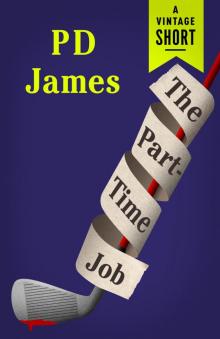 The Part-Time Job
The Part-Time Job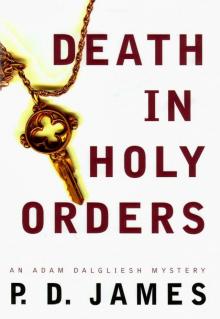 Death in Holy Orders
Death in Holy Orders The Victim
The Victim Shroud for a Nightingale
Shroud for a Nightingale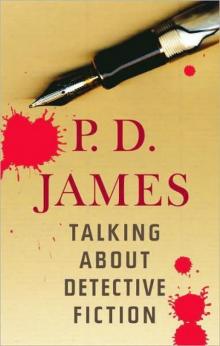 Talking about Detective Fiction
Talking about Detective Fiction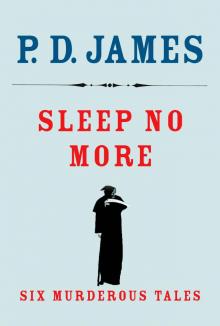 Sleep No More
Sleep No More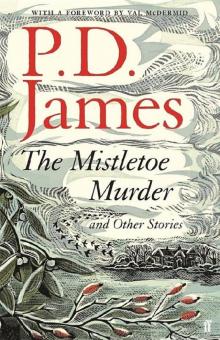 The Mistletoe Murder and Other Stories
The Mistletoe Murder and Other Stories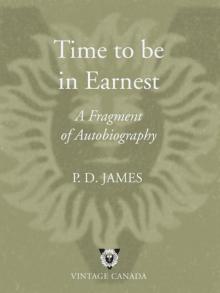 Time to Be in Earnest
Time to Be in Earnest Original Sin
Original Sin A Mind to Murder
A Mind to Murder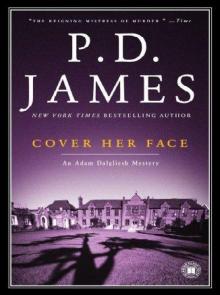 Cover Her Face
Cover Her Face Innocent Blood
Innocent Blood Devices and Desires
Devices and Desires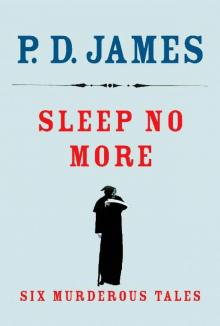 Sleep No More: Six Murderous Tales
Sleep No More: Six Murderous Tales Death Comes to Pemberley
Death Comes to Pemberley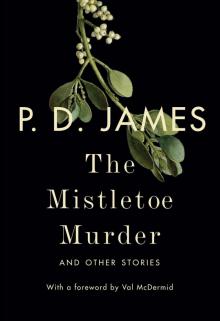 The Mistletoe Murder
The Mistletoe Murder Death of an Expert Witness
Death of an Expert Witness The Private Patient
The Private Patient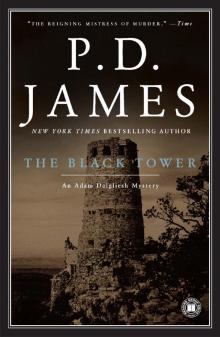 The Black Tower
The Black Tower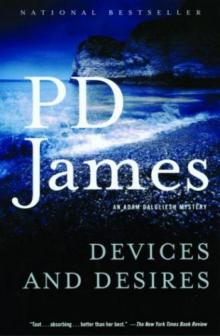 Devices & Desires - Dalgleish 08
Devices & Desires - Dalgleish 08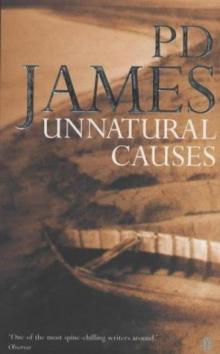 Unnatural Causes
Unnatural Causes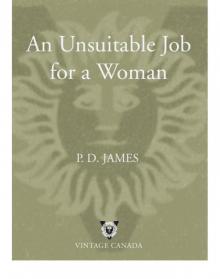 An Unsuitable Job for a Woman
An Unsuitable Job for a Woman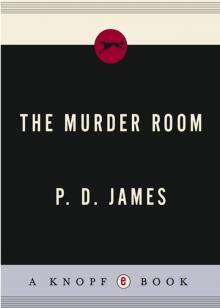 The Murder Room
The Murder Room A Certain Justice
A Certain Justice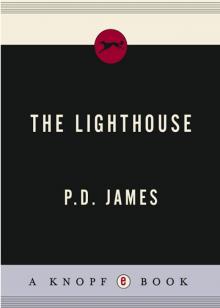 The Lighthouse
The Lighthouse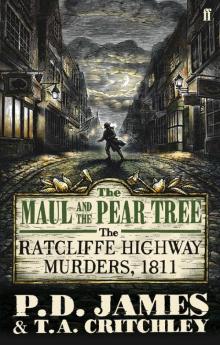 The Maul and the Pear Tree
The Maul and the Pear Tree